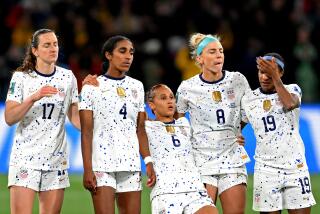Germany Has Its Own ‘Rudi’
- Share via
SEOUL — Germany is to World Cups what the omnipresent vending machine is to Asian cuisine. Efficient, mechanical and sturdy, they both yield a product that suffices yet seldom entices.
Whereas some machines specialize in soup or sandwiches or piping hot fried rice, Germany serves up quarterfinal berths. Sometimes it looks a little odd. Sometimes it makes weird noises. But dependability is something that can’t be overvalued when you’re in a strange country, as fans of France, Argentina and Italy surely will attest.
But when Germany qualified the other day for its 12th quarterfinal appearance in the last 13 World Cups, millions of customers previously served were demanding a refund. Germany’s 1-0 victory over Paraguay--scoreless until Oliver Neuville’s merciful 88th-minute goal--was the undisputed clunker in a lively second round of upsets and overtime thrillers. One newspaper in England went so far as to call it one of the worst World Cup games ever played.
German Coach Rudi Voeller, who has played in some great ones, bristled when informed of the dubious honor.
“If there is some criticism coming from England, then we must be doing something right,” Voeller deadpanned. “The fact that we have qualified must upset some people.”
Actually, considering the state of German soccer two years ago, qualifying for the quarterfinals qualifies as an absolute shock. German soccer reached its lowest ebb at the 2000 European championships, when the team failed to reach the second round of a major tournament for the first time since 1938.
The national team was so devoid of young talent then, Coach Erich Ribbeck opted to recall a relic, 39-year-old Lothar Matthaus, to head the German defense, to rather predictable results.
The job of coaching the national team was so unappealing that when the German federation fired Ribbeck after the tournament, none of the country’s top coaches was willing to replace him.
Out of desperation, the federation agreed to a layaway deal with Bayer Leverkusen’s Christophe Daum, who was contracted to stay with his club until the end of the 2000-2001 season. In the interim, Germany had a World Cup qualification campaign to wage, so the federation turned to former World Cup scoring hero Voeller and named him interim manager.
“It was the best thing they could do,” said Thomas Haeberlein, a soccer reporter for the German sports wire service SID. “Voeller gave them instant credibility. From that point on, players didn’t have an alibi again. He was always respected as a player, he had 90 caps and 45 goals for Germany, second only to Gerd Muller. He was always credible, and still is.
“From then on, the players knew that if they failed, they would have only themselves to blame. And the public knew as well.”
One crisis was averted, but a bigger one was knocking on the door. In the fall of 2000, Daum, responding to media rumors that he was a cocaine addict, submitted to a drug test. He failed, then admitted during a news conference that he used the drug on a casual basis.
Voeller was interim coach no more. After a few encouraging qualification-game results, including a 1-0 victory over England in the final game played at Wembley Stadium, Voeller was given a contract through the 2002 World Cup, and an anxious nation gave him an edict: Rudi can’t fail.
He came precariously close. Voeller’s team fell out of first place in its qualification group after a humiliating 5-1 home defeat to England in September 2001. Needing a victory at home against Finland to clinch qualification, Germany couldn’t manage more than a 0-0 tie and was forced into a two-game playoff with Ukraine.
“Too stupid for the World Cup,” read the headline in the German newspaper Bild the day after the Finland match. Another unimpressive tie followed in the first leg with Ukraine, requiring Germany to win the rematch or else.
Germany had never previously failed to qualify for a World Cup, so the subsequent 4-1 triumph was the cause for wild celebrations in the street. “It was like Easter and Christmas all falling on the same day,” Haeberlein said.
Voeller had a team in the World Cup. What he next needed was a team that wouldn’t embarrass itself in the World Cup.
The prospects, as late as a month ago, weren’t encouraging. Franz Beckenbauer, the legendary German defender and coach, dismissed the national team as “average” and “not ready yet.” German soccer, Beckenbauer acknowledged, “is a little depressed at the moment.”
The team eventually cobbled together by Voeller is built around an excellent goalkeeper, Oliver Kahn; six other so-called “Euro losers”--members of the failed Euro 2000 squad; and one undersized, 23-year-old forward named Miroslav Klose.
Klose first caught Voeller’s attention in early 2001, after working his way through the youth ranks to a starting position with the German First Division club Kaiserslautern, where Klose was an immediate scoring success. Some considered him too slight for the rigors of international competition, but Voeller, also economy-sized, gambled on Klose, saying the striker “reminds me of me.”
Voeller is famous for drawing the foul in the 1990 World Cup final against Argentina that set up Germany for the winning penalty kick. It was a classic piece of cunning--Voeller running alongside defender Roberto Sensini until Sensini extended his leg inside the box. Voeller saw the leg and fell over it. Penalty, goal, championship to Germany.
Germans have a word, schlitzohr, that describes someone who will tread the fine line between fair play and foul in order to get the best result for himself. On the soccer field, this extends to anyone who will do anything within the rules, and occasionally outside them, for the good of the team, for the purposes of scoring the vital goal. Voeller once fit that description as a player. Now, so does Klose, who has finagled his way to five goals in this World Cup, tying him for the lead with Brazil’s Ronaldo.
Backed by Kahn and a typically resilient defense, Klose has provided enough offense to keep Germany unbeaten through four World Cup matches, setting up a Friday quarterfinal against the United States that has Germany once again thinking semifinal, and beyond.
Beckenbauer has changed his mind on the team, saying last weekend that he now expects Germany to reach the final. “I fly home for a couple days, but will be back soon to watch the semifinals,” Beckenbauer told Bild. “Rudi should wait for me here or else I will get angry ... I believe Brazil and Germany will meet in the final.”
Maradona, who tangled with Voeller in the 1986 and 1990 World Cup finals, wrote in a guest column for the Swiss newspaper Blick that “Germany look invincible. Even though they display rather predictable performances, Germany appear to be too strong for their rivals.”
Voeller has the vending machine operational again. As they tell you here, it always helps knowing which buttons to push.
More to Read
Go beyond the scoreboard
Get the latest on L.A.'s teams in the daily Sports Report newsletter.
You may occasionally receive promotional content from the Los Angeles Times.







